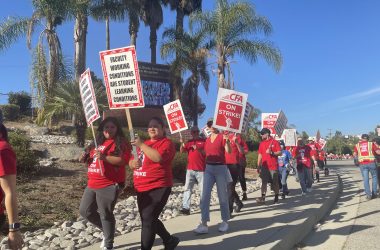Focusing on corporations gaining First Amendment rights and personhood, Corporate Corruption Week aimed to reveal that corporations do not promote democracy.
“The more power corporations have, the weaker democracy seems to be,” said Michael Lozano, sociology major and leader of Students United 4 Justice (SU4J).
The three-day event from April 27-29 was a collaboration between SU4J and the Student Sociology Association, consisting of prominent speakers and a mock funeral for democracy.
Lozano and Megan Chapinka founded SU4J specifically because of the Supreme Court’s decision to give corporations First Amendment rights.
“This event is something local, something global,” Chapinka said.
Corporations gained those rights by using the Fourteenth Amendment, which says that no state can deprive any person of life, liberty or property without due process of the law.
The Fourteenth Amendment was originally implemented to free slaves. Corporate lawyers “cleverly” applied it to corporations, according to The Corporation, a documentary that was shown as part of Tuesday’s meeting.
Wayne Taylor co-director of Reclaiming Democracy, a national organization, presented a slideshow of information that addressed what a corporation is, how they gained legal personhood and what solutions the public has to lessen corporate power.
One problem with corporate personhood is that “if a corporation is owned by people and a person owns a people, it’s a legal contradiction,” Taylor said.
Another problem is that “now McDonald’s can run for president,” Lozano said. “That’s the logic of it.”
Taylor defined corporations as entities that can sell anything—such as water, air and body parts—and can be in many places at once; and follow different national laws or no laws at all. Corporations are also immortal, Taylor said.
Taylor believes that corporations gained their power by controlling the law, politicians, courts and the media.
“They’re not evil,” Taylor said. “They just want to get involved in politics and they speak with their money.”
The biggest affect of the Supreme Court decision, according to Taylor, is that corporations are now able to give unlimited campaign donations, since they now have First Amendment rights.
Taylor believes that the best solution today for lessening corporate power is to pass Proposition 15 in California, which will provide candidates with $1.5 million of public funds and they can only receive that funding after they collect 7,500 $5 donations from registered voters.
Some students at the meeting said they followed their own practices in lessening corporate power.
“I know what corporations like Nike and Starbucks do. I take action every day by not shopping at Wal-Mart or buying Nike products,” said Rita Hannah, a senior sociology major. “People before profits.”
The event on Wednesday had a mock funeral, shown by bar codes and corporate logos taped over people’s mouths. It addressed the 4,000 people that die every day because of Long Beach pollution.
On Thursday, the documentary Crude will address the affect that Chevron’s oil business has had on Ecuador. Ecuador has sued Chevron for $7 million. The case is expected to be settled this year after 13 years of litigation.
Disclaimer: The Daily 49er is not responsible for Postings made on www.daily49er.wpengine.com. Persons commenting are solely responsible for Postings made on this website. Persons commenting agree to the Terms of Use of the website. If Postings do not abide by the Rules of Conduct or Posting Regulations as listed in the Postings Policy, the Daily 49er has all rights to delete Postings as it deems necessary. The Daily 49er strongly advises individuals to not abuse their First Amendment rights, and to avoid language suggestive of hate speech. This site also encourages users to make Postings relevant to the article or other Postings.



